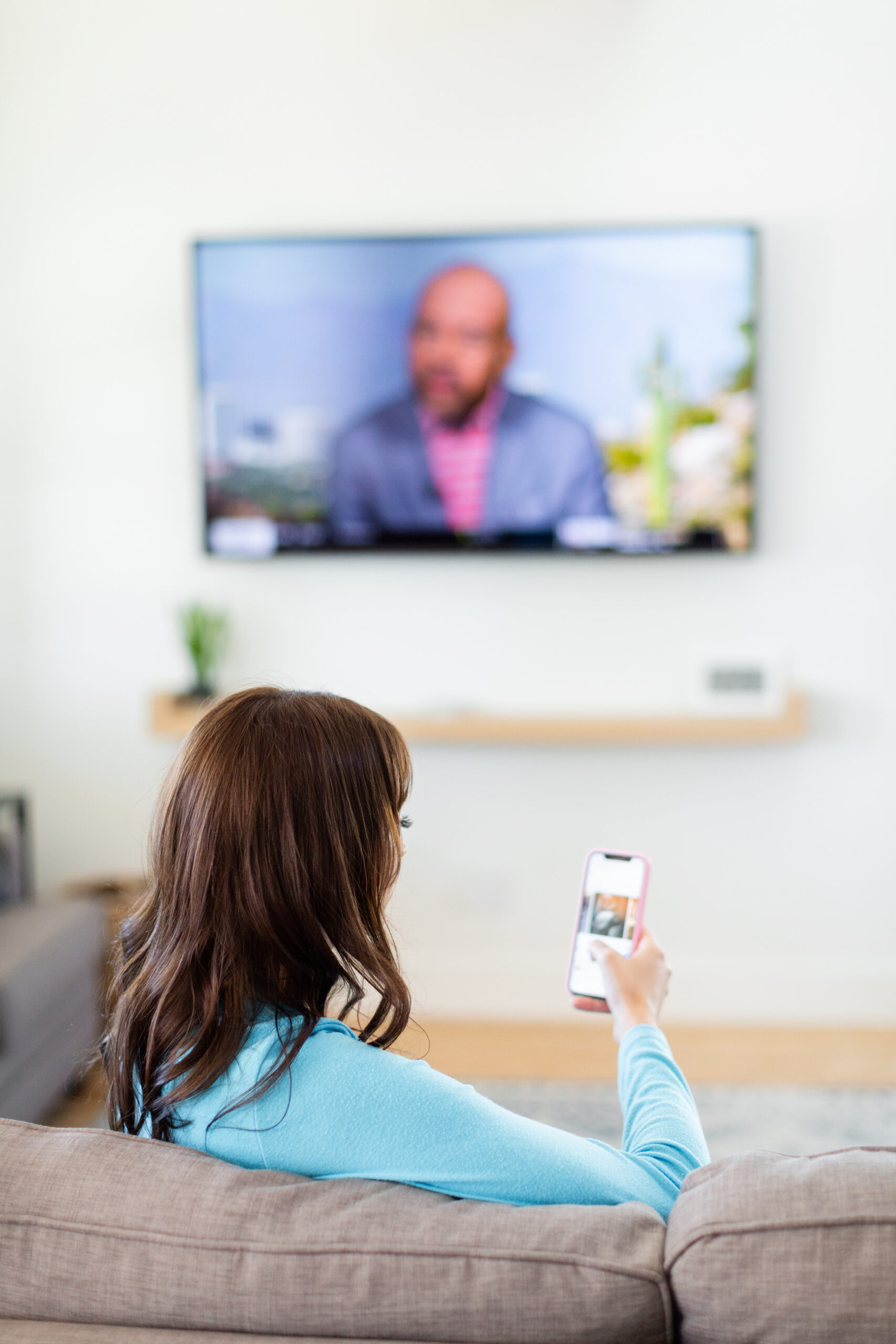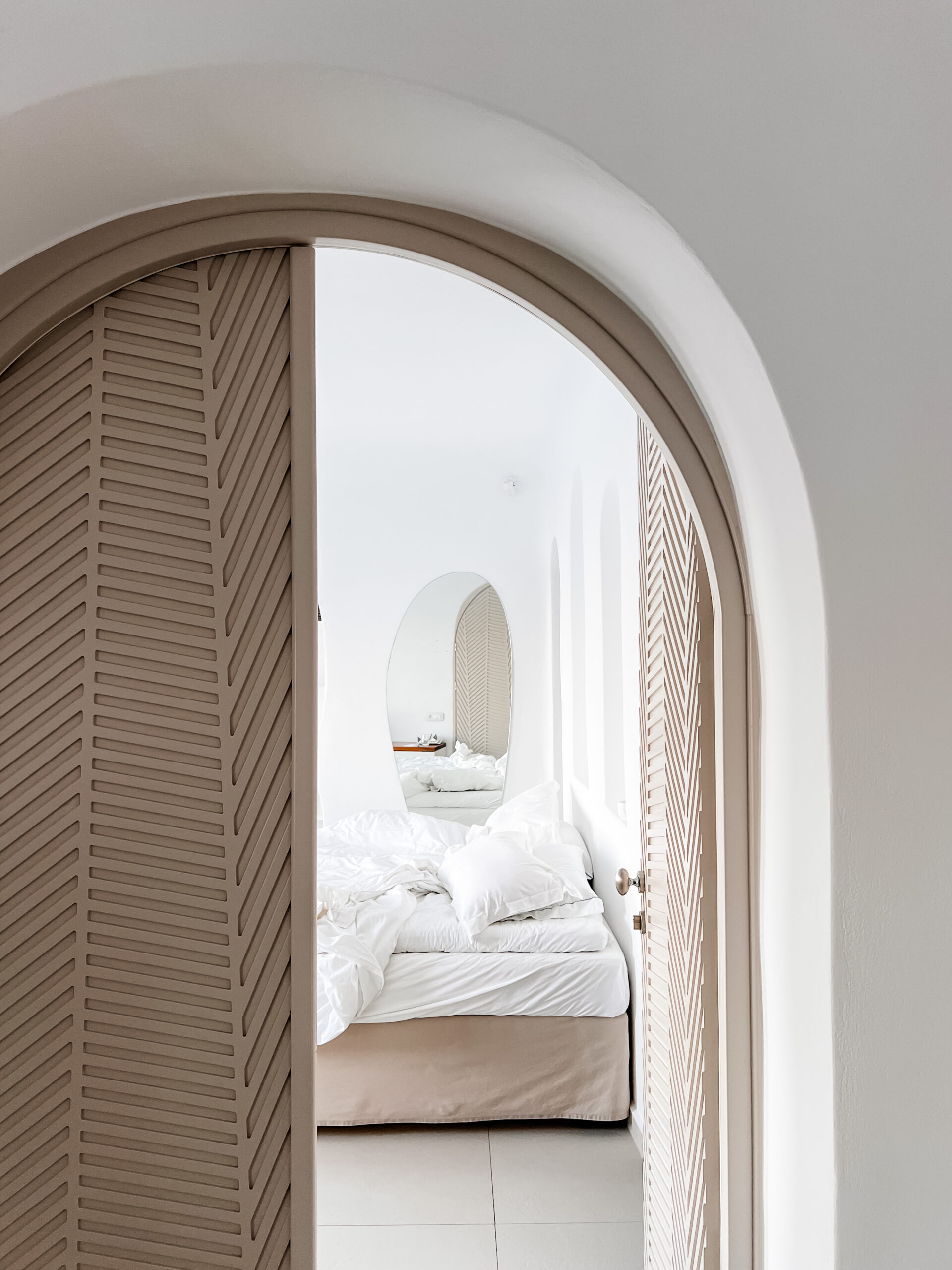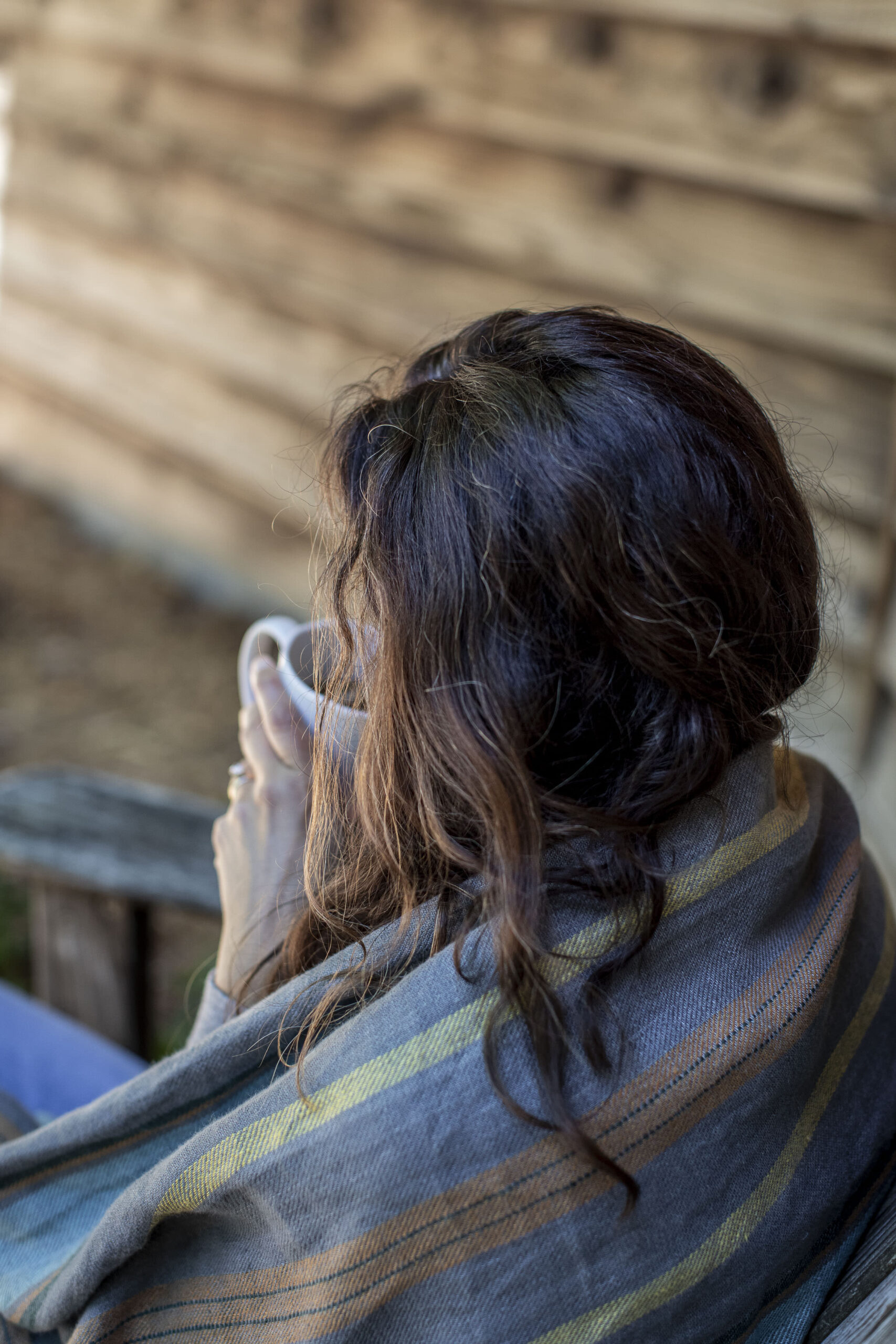
You know that moment when you sit down to relax after a long day, thinking you’ll just check one thing on your phone… and suddenly an hour has disappeared?
Or maybe you’ve noticed yourself reaching for your phone during every quiet moment—waiting for the tea kettle to boil, sitting in the waiting room, even during commercials when you’re already watching TV.
If you’re nodding along, you’re definitely not alone. As a psychiatric nurse practitioner I can tell you this: what I’m hearing from my patients about their relationship with technology has changed dramatically, and we need to talk about it.
Let’s Be Honest With Each Other
Here’s what I keep hearing in my practice:
“I spend hours on Facebook looking at everyone else’s lives, and then I feel lonelier than before I started.”
“I can’t fall asleep at night, but I don’t know why.” (Then I find out they’re scrolling in bed for an hour before trying to sleep.)
“I meant to look up one thing, and three hours later I’m still watching videos I don’t even care about.”
“My daughter calls, and I let it go to voicemail because I’m in the middle of reading comments on someone’s post about their vacation.”
Does any of this sound familiar?
Here’s the thing—and I want you to really hear this—this isn’t about being weak-willed or undisciplined. Your phone is literally designed to keep you hooked. It’s engineered by some of the smartest people in the world whose entire job is to make you keep coming back.
So if you feel like you can’t put it down, that’s not a character flaw. But it is something we need to address, because it’s affecting your brain, your sleep, and your quality of life.
What’s Really Happening in Your Brain
Let me share something important about how your brain works, because understanding this changes everything.
Your brain needs two different kinds of time. There’s “active” time—when you’re doing tasks, learning things, having conversations. And then there’s “processing” time—when your mind wanders, when you daydream, when you just sit and think without any particular agenda.
That second type? That’s when your brain does some of its most important work. According to research from Harvard Medical School, this is when you process emotions, file away memories, work through problems, and come up with insights.
But here’s what I see happening: when you’re constantly on your screen, your brain never gets this processing time. It’s like trying to clean your kitchen while someone keeps bringing in more dishes. Eventually, everything backs up.
And you can feel it, can’t you? That mental fog. That sense of being tired even though you haven’t really done anything physically demanding. That feeling like your thoughts are scattered and you can’t quite focus.
This is your brain telling you it needs a break.
The Loneliness Paradox
This breaks my heart a little, but I need to share it with you. Studies from Baylor University show that the more time people spend on social media, the lonelier they actually feel. And this effect is especially pronounced for those of us in our 60s and beyond.
Think about that for a moment. We have more ways to “connect” than any generation in human history, and yet we’re feeling more isolated.
You know the pattern: you’re scrolling through pictures of your friend’s family gathering, your former colleague’s cruise, someone’s beautiful garden. And where are you? Sitting alone in your living room, consuming other people’s lives instead of fully living your own.
Now, I’m not saying throw away your screens. After all, it’s probably how you see photos of your grandchildren. But there’s a huge difference between using technology to enhance your real relationships and using it as a substitute for them.
One of my patients put it perfectly: “I realized I know what everyone I went to high school with had for dinner last night, but I haven’t actually talked to my sister in two weeks.”
Your Body Is Trying to Tell You Something
You know your body always tells the truth, right? So pay attention to what happens after you’ve been on your phone or computer for an extended period:
- Your neck and shoulders ache from hunching over
- Your eyes feel strained and tired
- You have this restless, unsettled feeling
- You’re somehow both wired and exhausted at the same time
- You might even have a headache
Now think about how you feel after spending time doing something else—working in your garden, having coffee with a friend, reading an actual book, going for a walk in your neighborhood.
Completely different, isn’t it?
Your body knows the difference between real engagement with life and the pseudo-engagement of scrolling.
We Need to Talk About Your Sleep
As someone who has spent years helping women improve their sleep—it’s actually one of my specialties—I have to tell you this clearly: if you’re using your phone or tablet in bed, your sleep is suffering.
That blue light from screens? It suppresses your melatonin production. Melatonin is the hormone that helps you fall asleep and stay asleep. Research from the National Sleep Foundation shows that even two hours before bed, screen exposure can significantly disrupt your sleep cycle.
But it’s not just the light. It’s what you’re looking at. The news is usually stressful. Social media often stirs up emotions—comparison, envy, worry, frustration. Even “relaxing” videos keep your mind engaged when it should be winding down.
And then you wonder why you’re lying awake at 2 AM, exhausted but unable to sleep, your mind racing.
I see this pattern constantly in my practice: patients who can’t sleep, who feel tired all the time, whose mental clarity isn’t what it used to be. And when we dig into their evening routines, almost always there’s a phone or tablet in bed with them.
Sleep problems in seniors are reaching epidemic proportions, yet most of us have been told they’re simply “part of aging.” I can tell you this harmful myth is keeping millions of people from the restorative sleep they deserve. And excessive screen time—especially in the evening—is making it so much worse.
So What Do We Actually Do?
Here’s where I get practical with you. Because knowing there’s a problem doesn’t help unless you know what to do about it.
And please understand—I’m not going to tell you to get rid of your smartphone or never watch TV again. That’s not realistic, and it’s not what I’m suggesting.
What I am going to share are gentle, sustainable changes that actually make a difference. These are the same strategies that have worked for my clients, and I’ve seen the transformations firsthand.
Keep Your Bedroom Sacred
I know you’re probably using your phone as your alarm clock. I get it. But here’s what I want you to do: spend $10-15 on a simple alarm clock. You can find them at any drugstore or discount store.
Then—and this is the important part—charge your phone somewhere else. The bathroom. The kitchen. Your home office. Anywhere but your bedroom.
This one change alone will improve your sleep. I’ve seen it happen with so many of my patients that I can’t even count them anymore.
“But what if there’s an emergency?” I hear you. If you have elderly parents or health concerns that require you to be reachable at night, keep the phone in your bedroom but put it across the room, not on your nightstand. Make it inconvenient to grab casually.
Create Tech-Free Times in Your Day
Pick one part of your day when your phone goes in a drawer or another room. It doesn’t have to be a long time—start with just 30 minutes if that’s all that feels manageable.
Maybe it’s during your morning coffee. Maybe it’s during dinner. Maybe it’s the hour before bed. Maybe it’s when you’re spending time with your grandchildren.
One of my patients started putting her phone away during her afternoon tea. She said, “I didn’t realize how much I’d been missing—the birds at my feeder, the way the light comes through the window at that time of day, just my own thoughts without constant interruption.”
Pay Attention to Your Patterns
For the next few days, I want you to simply notice when and why you reach for your phone. Don’t judge yourself. Just observe.
Are you bored? Anxious? Avoiding something you need to do? Feeling lonely? Or is it just automatic habit?
Understanding your patterns is the first step to changing them. You might discover that you’re not actually getting what you need from the phone—you’re just using it as a distraction from uncomfortable feelings.
Rediscover the Art of Doing Nothing
Remember what it was like to just… wait? To stand in line at the grocery store and look around at people? To sit in your car for a few minutes before going into an appointment?
We don’t do that anymore. Every spare second gets filled with checking our phones.
Try letting yourself be bored sometimes. I know it feels strange at first—you might even feel a little anxious. But this is actually good for your brain. It’s in those quiet, empty moments that creativity shows up, that you process your experiences, that you think your own thoughts instead of constantly consuming other people’s.
Replace Screen Time With Something You Actually Enjoy
If you’re going to spend less time on your phone, you need something else to fill that time. Otherwise, you’ll just feel deprived and give up after a few days.
What did you used to love doing before smartphones took over? Reading mysteries? Working on puzzles? Knitting or crocheting? Calling friends to actually talk? Baking? Taking walks around your neighborhood?
Make it easy to do these things. Leave the book on your nightstand. Set up the puzzle on your dining room table. Keep your walking shoes by the door.
One of my patients started doing crossword puzzles again—something she’d loved for years but had stopped doing. She said, “I forgot how satisfying it is to actually focus on something and finish it, instead of just scrolling endlessly through things I’ll forget five minutes later.”
Why It’s So Hard to Stop (And Why That’s Not Your Fault)
Let me explain something about how your phone works, because this will help you be gentler with yourself.
Every time you check your phone and see something new—a text message, a Facebook notification, a like on your photo—your brain gets a little hit of dopamine. Dopamine is a chemical that makes you feel good, and it’s involved in all kinds of addictive behaviors.
Tech companies know this. They’ve designed these apps specifically to trigger these dopamine hits, to keep you coming back, to make it hard to put the phone down.
So if you find yourself picking up your phone over and over, even when you told yourself you wouldn’t, that’s not weakness. That’s neuroscience. Your brain has been trained to crave these little hits.
But—and this is important—you can retrain your brain. It takes some time and conscious effort, but I’ve seen countless people do it successfully, including me. You can too.
What One of My Patients Discovered
I want to share something one of my patients told me recently, because I think it might resonate with you.
She’s 67, retired, living alone. She’d been feeling increasingly depressed and couldn’t figure out why. Her health was good. She had enough money. She had family nearby.
We started talking about her daily routine, and it turned out she was spending 4-5 hours a day on Facebook and news websites. She’d wake up and immediately check her phone. She’d scroll during breakfast, lunch, and dinner. She’d spend her evenings watching TV with her tablet in her lap, switching back and forth.
I asked her to try something: for one week, no phone or tablet in the morning until after breakfast, and none in the evening after 7 PM.
The first few days were hard. She felt anxious and restless. She didn’t know what to do with herself.
But then something shifted. She started noticing things again—really noticing them. The way her coffee smelled in the morning. The finches at her bird feeder. Her own thoughts and feelings without the constant overlay of other people’s opinions and problems.
By the end of the week, she said she felt like she’d woken up from a fog. She still uses her phone and tablet, but now they’re tools she uses intentionally, not things that use her.
A Small Experiment I Want You to Try
Here’s what I’d like you to do: sometime in the next day or two, put your phone in another room for one hour. Just one hour.
Then do something with your complete attention. Drink your tea slowly, noticing the warmth of the cup in your hands, the aroma, the taste. Take a walk and actually look at your neighbors’ gardens, the architecture of the houses, the sky. Call a friend and really listen, not thinking about other things you need to do.
At first, you might feel uncomfortable. You might feel like you’re missing something important. (You’re probably not.) You might feel restless or even anxious.
But stick with it. Because underneath that discomfort, you’ll start to notice something else: a sense of presence. Of actually being in your life instead of watching it pass by while you stare at a screen.
What I Want You to Remember
Let’s talk about why midlife—especially your 60s and beyond—is actually the perfect time to change your relationship with technology.
You’ve lived long enough to remember what life was like before smartphones. You know what it feels like to be fully present, to have undistracted conversations, to spend an afternoon without checking anything digital.
You have the wisdom to recognize when something isn’t serving you, even if everyone else is doing it.
And you have the life experience to know that the important things—the relationships, the experiences, the quiet moments of contentment—those don’t happen on a screen.
Your real life is happening right now. Not the version you see on Facebook. Not the news cycle. Not the group chat. But this: the chair you’re sitting in, the light coming through your window, the people in your life (or the lovely solitude if you live alone), the thoughts in your own head.
Don’t miss it because you’re staring at a screen.
Your Challenge (If You Choose to Accept It)
I’m not going to tell you to delete all your apps or throw your phone away. That’s not realistic or necessary.
But I am going to ask you to choose one—just one—of these actions to try this week:
- Keep your phone out of your bedroom starting tonight
- Don’t check your phone for the first hour after you wake up
- Put it away during all meals
- Take a 30-minute walk without it
- Have one screen-free evening where you do something you used to love
Just one. That’s all I’m asking.
And then notice how you feel. Not how productive you were. Not how many things you got done. Just… how do you feel?
More rested? More present? More like yourself?
The Bottom Line
Your brain needs rest. Your eyes need a break. Your nervous system needs quiet. Your sleep needs protection. And you—you deserve to actually live your life, not just watch other people live theirs or constantly document your own.
I know the pull is strong. I know you’ll probably slip up and find yourself scrolling when you said you wouldn’t. That’s okay. This isn’t about perfection.
It’s about gently, persistently, choosing to show up for your real life. It’s about protecting your peace, your sleep, your mental clarity, and your time.
Every time you put the phone down and choose presence instead, you’re doing something powerful. You’re telling yourself that you matter. That your actual life—this precious, limited time you have—is worth your full attention.
And it absolutely is.
So let’s do this together. Small steps. Small acts of presence when distraction feels easier. It all adds up to a life that’s truly yours, lived in full awareness, with a brain that has the space it needs to rest, restore, and find joy in simple moments.
Here’s to quiet mornings without screens. Here’s to evenings that wind down naturally into restorative sleep. Here’s to conversations where you’re really listening. Here’s to memories you make instead of just scrolling through other people’s.
Sweet dreams—the real kind, that come from days fully lived and minds gently rested. 🌸✨
P.S. If sleep is a major struggle for you—and especially if screen time is part of the problem—check out my Sweet Dreams After 60 course. Because at this stage of life, you deserve rest that truly restores you.
You may also like:
Put Down Your Phone (or Tablet, or Computer) and Pick Up Your Life: A Real Talk About Screen Time
October 2, 2025
meet inge
I’m Inge, a Psychiatric Nurse Practitioner passionate about helping others feel grounded, resilient, and well. Here on the blog, I share insights on mental health, prevention, meditation, clean skincare, and nutrition—everything I turn to in my own daily life. I hope this space becomes a trusted part of your wellness journey.
LATEST FROM THE BLOG


Has this ever happened to you? You wake up exhausted, even though you slept eight hours. Your brain feels foggy—like you’re moving through the world behind a pane of glass. Small tasks feel overwhelming. And maybe there’s a heaviness to your mood that doesn’t quite match your life circumstances. If this sounds familiar, you’re not […]

We’ve all heard the stories whispered in coffee shops and support groups. A mother reaches for her phone to call her adult child, then remembers—the number has been blocked. Another sits at a holiday table with an empty chair, the absence more present than anyone who remains. A grandmother holds a birthday card she’ll never […]

You know that moment… When you wake up in those first days after surgery and the reality hits you: your body feels broken. Your hip, knee, or shoulder—the very joint that’s supposed to carry you through life—is now a source of pain and limitation. Maybe you’re lying there thinking: “I’m too old for this. I’ll […]

Why Deep Sleep Matters More Than You Know How prioritizing your nights could be the most powerful dementia prevention strategy available ============================================================================ YOU KNOW THAT MOMENT… When you drift off to sleep, and your body finally releases the tension of the day. Your mind quiets. Your breathing deepens. For a moment, everything feels… at peace. […]